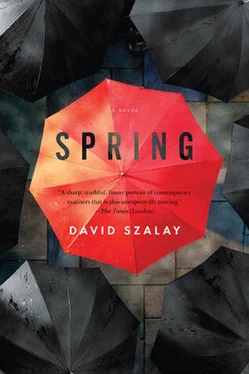His answer was—‘Systems testing.’
‘What sort of systems?’ Freddy said.
When he heard what sort of systems, Freddy started to take more interest in Michael. He pressed him for more information about his systems—monosyllabic Michael was not very forthcoming—and finally managed to persuade him to send him their selections by email every morning. For a week, Freddy just monitored these selections. Michael himself had said he did not put money on them, in spite of the fact that he kept a tally of their performance, which showed them to have made a profit over several years. And they made a small profit in the first week that Freddy monitored them. In the second week they made a large profit and Freddy plunged in. Soon he was making several hundred pounds a week. It was then—very full of himself and his several hundred pounds a week—that he told James. It had obviously never occurred to Freddy, as it quickly occurred to James, that there was the potential here to make much more than that by selling the tips on the Internet or through a premium-rate phone line.
One afternoon, they took the train down to Shooter’s Hill to see Michael. He was a large man, putty-pale. There was something odd about him. James explained that he wanted to pay him for his horse-racing tips. He had had in mind to pay Michael a percentage of subscription fees, or winnings, or something like that. However, it was obvious that Michael would prefer a flat fee, so James offered him £200 a week. James also wanted him to work in an office—he wanted the tips, the spreadsheets, whatever there was, on a hard drive he owned, in a space he paid for. Though this Michael was initially less keen on, he was soon spending an enormous amount of time in the office. Most of the time, in fact. The following scene was fairly typical.
Michael is sitting at his desk, working. The door opens. Michael does not look up or say a word. James shuts the door. ‘Morning,’ he says. ‘How’s it going?’ Still Michael says nothing. ‘How’s it going?’ James says again. This time Michael says, ‘Have you got my Coke?’ With a thud James puts the two-litre plastic flagon of Coke on Michael’s desk. Michael does not thank him. Without taking his eyes off the monitor in front of him, he opens the Coke and pours some into a plastic cup. ‘So how’s it going?’ James says again, sitting down at his own desk. When Michael still does not answer, James tries a more specific question. ‘Lots of selections today?’ Purposefully mousing, Michael does not seem to hear.
Michael’s systems, of which there were many, were purely quantitative—for all James knew, Michael had never seen a horse in his life. He seemed to have no idea that horse racing is something that actually happens, that the names of the tracks are the names of actual places, that people and horses and money and mud are involved; to him it seemed to be nothing more than an endless supply of new numbers on a screen—numbers in which to search for patterns, a puzzle that was never finished. For the first two months these numbers—marketed by James under the name of Professional Equine Investments—showed a nice profit, and the service soon had a few dozen subscribers. Unfortunately the first few months turned out to be unusual. More typical was a situation in which one week’s profit was offset by the next week’s loss, and the service just scraped along. Then started a monstrous sequence of losers, and James would sit at his desk while the rain fell outside, waiting for some antediluvian version of Windows to appear on the smouldering monitor and staring with something like hatred at Michael’s slack face, his sensuous mouth hanging open as he worked mechanically through the fiddly statistical analysis of his systems. He did not seem to notice that he was on a monster losing spree. That the subscribers were losing money while he still picked up his £200 a week. At such times, his wanting a flat fee seemed sly and even dishonest to James, who was unable to help feeling that this strange man, this hulking idiot in his nylon jacket and milk-white trainers, had somehow swindled him out of thousands of pounds.
Michael was spending less time in the office too. He was in later—sometimes quite late, and looking like he had not slept—and he left earlier. Indeed, he seemed to have something on his mind. For instance, he had started to stare out the window. That was not something he had ever done in the past, and now he would sit there for minutes at a time, while the Coke hissed in his cup, staring out the window at the East End sky.
‘Michael,’ James would say.
And Michael would not seem to hear.
‘Michael!’
And finally he would turn his oversized, unkempt head—exactly the way that Hugo did—unhurriedly and with a vacant expression in his docile chocolate eyes.
None of this prepared James for the phone call he received one Monday morning in early November.
He was out with Hugo when Freddy phoned. This was surprising in itself—it was not even eight.
‘I thought you might want to know,’ Freddy said, with a smile in his voice, ‘that Michael is in police custody.’
‘What?’
‘I thought you might want to know,’ Freddy said, even more slowly than the first time, ‘that Michael is in police custody. I’m not joking.’ He started to laugh. ‘He’s in a cell in Thamesmead Police Station.’
‘What are you talking about? Why?’
‘You’ll love this. Some sort of sexual assault.’
A long silence. Then James said, ‘You’re joking…’
‘No I’m not! That’s the point. I’m not joking! I just found out myself.’
‘How did you find out?’
‘Melissa. She sent me a text. I just spoke to her…’
‘What did she say?’
‘Just what I told you. Michael’s in a police cell, and it’s some sort of sex offence. I don’t know what he did exactly,’ Freddy said. ‘I just thought it was quite amusing.’ He seemed frustrated that James did not share his amusement.
‘You’re not joking?’ James said.
‘No.’
‘What’s Melissa’s number?’
‘Why?’
‘I need to speak to her. I need to find out what the fuck is going on.’
Melissa was on her way to work.
‘Yeah, that’s right,’ she said. She didn’t sound particularly put out. ‘Michael’s in the nick.’
He was apparently arrested on Sunday morning at the house of a woman who lived a few streets away in Shooter’s Hill.
The facts emerged at the trial the following summer. What seems to have happened is this—some time in September Michael was in a supermarket near his home. As he was paying, something startled him and he dropped his money onto the floor. The woman who was next in the queue had helped him pick it up. She smiled at him. Their hands momentarily touched. That was the first time he saw her.
Starting the next morning, he waited near the supermarket, hoping to see her again. When he did, he followed her home. It was a few days later that she first noticed him. She started seeing him in unexpected places, sometimes far from Shooter’s Hill—on the tube, in shops in the West End—and it was obvious that he was following her. When he followed her home and stood waiting outside, she phoned the police.
The next day they stopped him in the street and issued an informal warning. They told the woman they expected he was ‘scared out of his wits’ by their intervention—he had looked scared out of his wits when they walked up to him—and that he would now leave her alone. And he seemed to, until a week or so later she spotted him outside her office and he followed her onto the Docklands Light Railway. It was typical of Michael that when the police told him he’d be in trouble if he kept hanging around outside her house, he started hanging around outside her office instead. The second warning was more formal than the first. This time they took him to the station and made him sit in an interview room for an hour while they said things like, ‘You don’t want to go to prison, do you, Michael?’ They said that if they had to have him in again they would tell his ‘mum and dad’. ‘And what would they think, Michael, if they knew about this? Eh?’
Читать дальше












